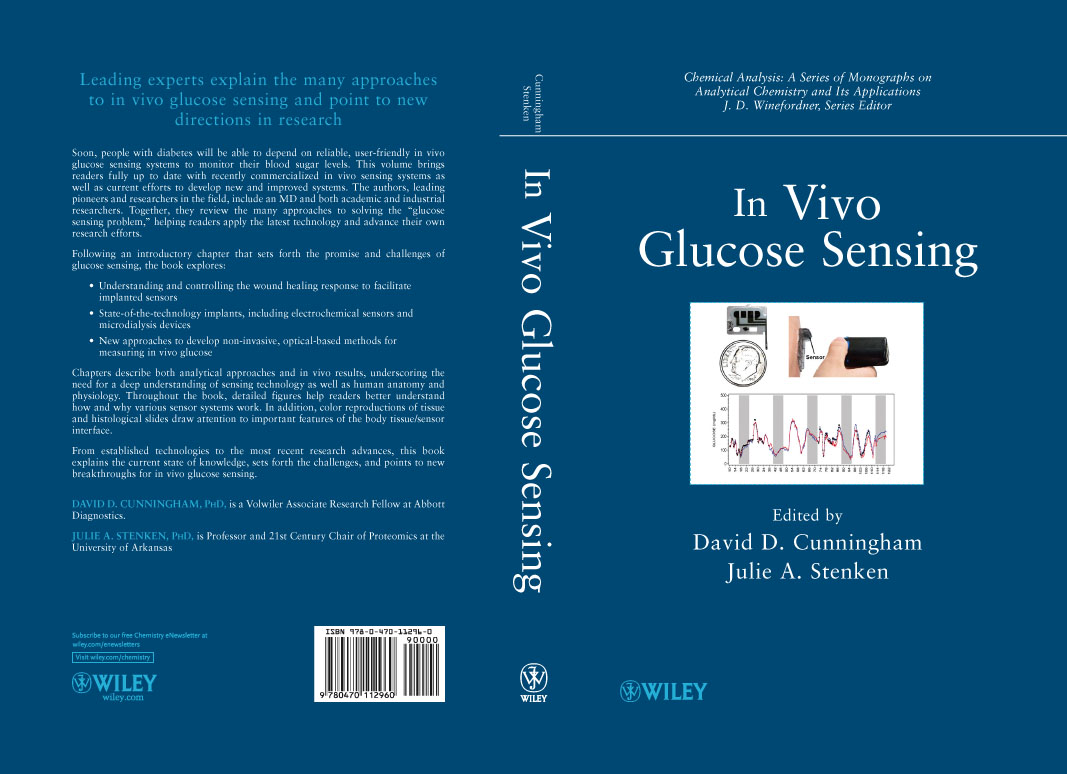Researcher Edits Book on In Vivo Glucose Monitoring
FAYETTEVILLE, Ark. – Scientists hope to provide people who have diabetes with a glucose monitoring system that doesn’t require needle sticks and lasts for six months or more, but they are still a long way from this goal. A new book edited by a University of Arkansas researcher and her colleague brings together the most current research in this area and outlines the challenges that remain on the path to creating a better glucose monitor.
“There’s an enormous need for glucose monitoring for people with type 1 and type 2 diabetes as well as individuals in intensive care,” said Julie Stenken, a professor of chemistry and biochemistry who holds the Twenty-First Century Chair in Proteomics. “But the complexity of the human body makes measuring glucose, a compound that can be easily measured in a beaker, quite difficult.”
Stenken is co-editor of In Vivo Glucose Sensing with David D. Cunningham of Abbott Laboratories. The book is designed to provide state-of-the-art information on glucose monitoring to clinicians and medical educators. The book has 15 chapters by various authors, including Stenken herself.
“There are a lot of different ways to approach this complex chemical analysis problem,” she said.
Scientists striving to make sensors that monitor glucose in real time struggle with two major challenges: First, scientists trying to create implantable sensors must deal with the foreign body reaction, where a person’s body attempts to wall off the implanted material from healthy tissue.
“The foreign body reaction involves inflammatory cells that come in to attack and ultimately encapsulate the foreign object,” Stenken said. This is a problem with the widely used implanted sensors, including electrochemical-based sensors from Abbott, DexCom and Medtronic, since they require frequent finger-sticks to recalibrate due to the walling off process. Additionally, after these sensors have been implanted for up to seven days, the FDA prohibits these sensors to be used for making clinical decisions and the sensor must be replaced via another needle stick.
Specialized proteins orchestrate the foreign body reaction. “Researchers are trying to modulate the protein message to achieve longer implant times with the implanted sensors,” she said. Work in the Stenken laboratory focuses on determining the best drug cocktail to use to achieve longer lasting implanted devices.
Second, researchers working on pain-free optical-based measurements struggle with the variability of blood chemistry and tissue differences from person to person. This causes the calibration of the sensor to be a technically challenging process.
“At this time, all the non-invasive, pain-free, long-term methods are still experimental,” Stenken said.
In Vivo Glucose Sensing is published by John Wiley & Sons. Stenken is a professor in the J. William Fulbright College of Arts and Sciences.
Contacts
Julie Stenken, professor and Twenty-First Century Chair in Proteo
J. William Fulbright College of Arts and Sciences
479-575-7018,
jstenken@uark.edu
Melissa Blouin, director of science and research communication
University Relations
479-575-3033,
blouin@uark.edu
Headlines
PetSmart CEO J.K. Symancyk to Speak at Walton College Commencement
J.K. Symancyk is an alumnus of the Sam M. Walton College of Business and serves on the Dean’s Executive Advisory Board.
Faulkner Center, Arkansas PBS Partner to Screen Documentary 'Gospel'
The Faulkner Performing Arts Center will host a screening of Gospel, a documentary exploring the origin of Black spirituality through sermon and song, in partnership with Arkansas PBS at 7:30 p.m. Thursday, May 2.
UAPD Officers Mills and Edwards Honored With New Roles
Veterans of the U of A Police Department, Matt Mills has been promoted to assistant chief, and Crandall Edwards has been promoted to administrative captain.
Community Design Center's Greenway Urbanism Project Wins LIV Hospitality Design Award
"Greenway Urbanism" is one of six urban strategies proposed under the Framework Plan for Cherokee Village, a project that received funding through an Our Town grant from the National Endowment for the Arts.
Spring Bike Drive Refurbishes Old Bikes for New Students
All donated bikes will be given to Pedal It Forward, a local nonprofit that will refurbish your bike and return it to the U of A campus to be gifted to a student in need. Hundreds of students have already benefited.





